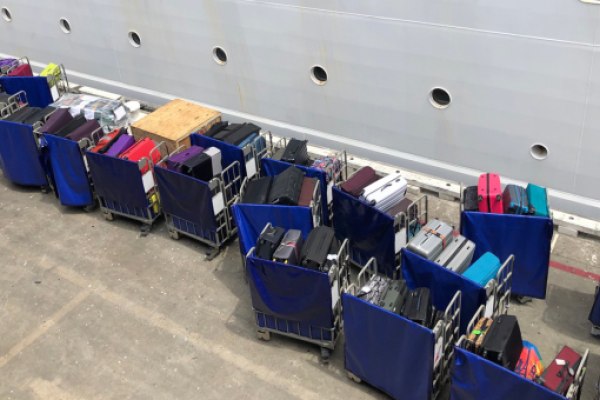
Stephanie Hayward
Published: August 10, 2018
The Court of Appeal recently affirmed the decision of the Admiralty Registrar Jervis Kay QC in the matter of Lawrence v NCL (Bahamas) Ltd t/a Norwegian Cruise Line (“NCL”)- QBD (Admlty Ct) (Jervis Kay QC, Admiralty Registrar [2016] EWHC (Admlty)- 6 May 2016.
The case addresses the meaning of Paragraph 8 of Article 1 of the Athens Convention and when a tender service provided by a third party forms part of the ‘course of carriage’.
Background
The claim brought by Mr Lawrence was a claim for damages for personal injury when he fell whilst on board a tender taking passengers to shore in Santorini.
Mr Lawrence booked his holiday through Flights and Packages Limited (“FPL”). The holiday included flights, a cruise on board the ’Norwegian Jade’, operated by NCL, and three nights hotel accommodation in Venice. Mr Lawrence paid FPL for the hotel and cruise but was invoiced separately for the flights. Mr Lawrence received an email for the booking of the cruise and the hotel which confirmed that FPL were acting as agent and had placed the booking with various tour operators.
At Santorini NCL offered shore excursions. A tender operated by the Union Boatmen of Santorini was available for the use of the passengers to go ashore. The tender, however, did not form part of the equipment of the “Norwegian Jade”.
Mr Lawrence and his wife boarded the tender to go ashore at Santorini. There were no seats available on the upper deck of the tender so Mr Lawrence and his wife proceeded forward on the main deck. Whilst doing so Mr Lawrence tripped over a raised sill at the doorway leading to the cabin and suffered injury to his chin, legs and shoulder. Mr Lawrence alleged the raised area was in darkness with little discernible light.
Mr Lawrence brought a claim for damages for personal injury against NCL as carrier / performing carrier under the Athens Convention.
NCL:
- Denied that they were the carrier or the performing carrier within the meaning of Article 1 of the Athens Convention.
- Claimed that the contract of carriage was between Mr Lawrence and FPL, through whom Mr Lawrence had booked his cruise.
- Denied that they had any control over the tender or that it was a period of carriage within the meaning of paragraph 8 of Article 1 of the Athens Convention.
Admiralty Registrar Jervis Kay QC found in favour of Mr Lawrence on the basis:
- NCL was the contractual carrier under the Athens Convention.
- The incident occurred within the course of carriage.
- NCL as the “performing carrier” was responsible for the actions or omissions of the Union Boatmen of Santorini. In this respect the Admiralty Registrar noted that Mr Lawrence had not paid a specific fare for use of the tender. NCL’s Guest Relations Supervisor confirmed that NCL did not charge an additional fare and it was considered a service provided within the fare paid by Mr Lawrence.
- The step on the tender was potentially hazardous and required further action to bring the step to the attention of passengers.
Application for permission to appeal
NCL sought permission to appeal on the following grounds:
- The Judge was wrong to find that NCL was the contractual carrier under the Athens Convention.
- The Judge was wrong to find Mr Lawrence’s fall occurred in the course of carriage and,
- The Judge was wrong to find that NCL was guilty of/responsible for “fault or neglect” by failing to adequately mark or give warning of the step.
The application for permission to appeal came before Lord Justice Hamblen on 27 November 2017.
Ground one
The Athens Convention applies to “international carriage” and provides at Article 1.1 (a) that “carrier” means:
“a person by or on behalf of whom a contract of carriage (emphasis added) has been concluded, whether the carriage is actually performed by him or by a performing carrier;”
Article 1.1(b) provides that the “performing carrier” means:
“a person other than the carrier, being the owner, charterer or operator of a ship, who actually performs the whole or a part of the carriage”
Lord Justice Hamblen observed that the Admiralty Registrar was right to say that NCL was the contractual carrier. He accepted that FPL were acting as Travel Agent. The booking conditions stated that a booking made through a travel agent became a binding contract with NCL when the travel agent received confirmation of the booking and reservation number. NCL provided a reservation number and two booking confirmations. One stated it was a “Travel Agent Copy” and the other a “Guest Copy”. FPL made it clear at the time of the booking that they were acting as agents and not as tour operators. The booking conditions also provided that the Athens Convention applied to the cruise element of the holiday.
NCL sought to rely on the preamble of the booking conditions which provided that where the passenger booked the cruise arrangements with the tour operator, the contract would be with the tour operator. If the passenger booked the cruise arrangements with a travel agent the contract could be with NCL or with the travel agent, depending on how the booking was made. Lord Justice Hamblen was satisfied that Mr Lawrence had contracted with NCL by virtue of FPL having made it clear they were travel agents and by NCL having provided a travel agent copy of the booking confirmation. NCL was the contractual carrier within the meaning of Article 1.1 (a), therefore, the first ground of the appeal failed.
Ground two
As to the second ground for appeal, that the judge was wrong to find that the trip occurred in the “course of carriage”, Lord Justice Hamblen confirmed that the Athens Convention defines the “course of carriage” in the following way:
(a) “With regard to the passenger and his cabin luggage, the period during which the passenger and/or his cabin luggage are on board the ship or in the course of embarkation or disembarkation, and the period during which the passenger and his cabin luggage are transported by water from land to the ship or vice-versa, if the cost of such transport is included in the fare or if the vessel used for this purpose of auxiliary transport has been put at the disposal of the passenger by the carrier. However, with regard to the passenger, carriage does not include the period during which he is in a marine terminal or station or in or on any other port installation;
NCL submitted they were only responsible for the passenger when he is transported from the ship to port by water transportation if the passenger and his cabin luggage are being transported at the same time. This was not accepted by either the Admiralty Registrar or Lord Justice Hamblen.
Lord Justice Hamblen concluded that the purpose of Article 1.8 of the Athens Convention is to ensure that there is responsibility for both the passenger and luggage during the periods of carriage identified. Responsibility does not depend on whether the passenger is being transported with or without his luggage.
In the earlier stages of the appeal the Court had concluded that Article 1.8(a) should be read so that:
“The use of the word “and” in the relevant part of Article 1.8(a) is shorthand for the previous expression “and/or”.
The Judge went on to explain that to decide that the convention applied when the passenger had luggage with him, but would not apply if he did not, was absurd.
NCL had also submitted that Article 1.8 did not apply as they did not provide tender services. The Admiralty Registrar had found that on balance of probability the tender service was either organised and paid for directly by NCL or it was supplied as part of the port facilities provided to the ship. Therefore, he concluded that the tender was a vessel which had been placed at the disposal of the disembarking passengers by the carrier NCL.
Ground three
The final ground for appeal, that it was wrong to conclude NCL was responsible for the fault or neglect in failing to adequately mark or give warning of the step, was also unsuccessful. Lord Justice Hamblen found this ground of appeal was a challenge to the Admiralty Registrar’s finding of primary fact and, therefore, had no real prospects of succeeding.
Lord Justice Hamblen refused the application for permission to appeal.
Comment
Pursuant to the Athens Convention a carrier or performing carrier will be liable to the passenger for incidents in which they suffer a personal injury during the course of carriage.
The course of carriage includes the period of embarkation and disembarkation and the period the passenger is on board the ship. Carriage also includes when the passenger is transported by water from land to the ship or vice-versa. Notwithstanding the wording of the Athens Convention it is not necessary for the passenger to also be transporting his luggage for the transportation to be considered carriage. The Admiralty Registrar pointed out in any event that even if a literal approach were to be taken, Article 1.6 defines cabin luggage as luggage otherwise in his “possession, custody or control” and a passenger was likely to have some of his possessions with him when going shore side.


